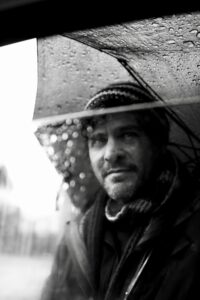— The Dallas Morning News
“Ingeniously scored…with an almost unbearable poignancy”
— The Boston Globe

It says quite a great deal that Howard Frazin’s Amid a Crowd of Stars—an unaccompanied Yeats setting for Robert Honeysucker, then a gently chromatic, dreamy, Delius-like rhapsody for an orchestra of 15—made such an attractively atmospheric impression.
— The Boston Globe
The Jester, the Artist, and the Little Lion, scored for cello, piano, and alto sax, is one of Howard Frazin’s best works. Elegant and attractive, it inhabits a lightly clouded tonal world that ably weds aspects of Leonard Bernstein and Olivier Messiaen. There’s plenty of intricate textural detail that pleases, too—it’s charming without being lightweight.
— New Music Connoisseur
Frazin likes pretty tunes of the old-fashioned sort, and picks strong texts. — The Boston Globe
A brooding sound world reminiscent of Maurice Ravel and Bernard Herrmann. — 21st Century Music
The pianist’s strong lyrical bent and feeling for nuance…suits Howard Frazin’s suite Music for the End of Winter, especially in the wistful first, third and fifth movements.
— Gramophone
The piece flows seamlessly, breathing in long phrases while harmonies shift rapidly and constantly underneath expressive melodies. In The Forests of the Night was accessible and familiar, yet filled with emotional tension and dramatic complexity. It was a good choice for BCO to commission Frazin to write a piece for its 30th season; Frazin’s music is pensive and original, while still within the immediate grasp of classical musicians and audiences.
— Peter Van Zandt Lane, The Boston Musical Intelligencer
An arching string of nocturnes, foreboding to frightening to gently mysterious: rustling strings, keening fragments of melody. Harmonies are tonal, but used more as a coloristic resource than a structural scaffold…a rich debut.
— Matthew Guerrieri, The Boston Globe
Howard Frazin’s The Monkey Who Had No Arms was the next-most pleasant discovery. Intimate discourse woven of complementing instrumental melody characterizes this duet for viola and cello.
— Michael Manning, The Boston Globe
The five movements of Howard Frazin’s Music for the End of Winter—all of them poised, delicate, terse—showed an unmistakable ease in working their somewhat Faure- and Ravel-like idiom. — The Boston Globe
[Fenwick] Smith returned in a Longy School Septemberfest program dedicated to music by composers associated with that institution, now in its 80th year. He played the gifted young Howard Frazin’s recent Sonata for Solo Flute. — Lloyd Schwartz, The Boston PhoenixContact Listen